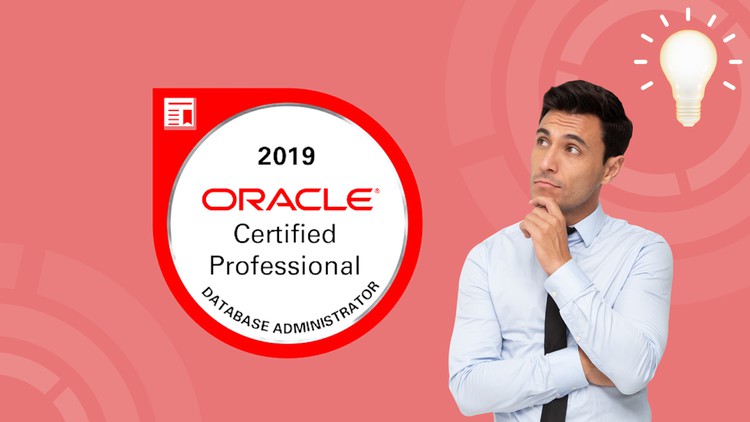Oracle Database Administration Exam: 1Z0-082 | OCP 19c 2025
Master the OCP 19c Oracle Database Administration Exam: 1Z0-082 : Verified Practice Questions and Answers
4.30 (27 reviews)

150
students
140 questions
content
Jan 2025
last update
$44.99
regular price
Why take this course?
based on the comprehensive list you've provided, here are some key topics that Oracle Database: Administration Workshop (ODAW) and Oracle Database: Introduction to SQL (ODIS) cover. These topics are essential for individuals preparing for Oracle DBA certification exams, such as the OCP (Oracle Certified Professional) or the more specialized Oracle Database Administrator I and II certifications, as well as for those looking to understand and work with SQL in Oracle databases.
For ODAW:
- Database Installation and Configuration: Understanding the installation process, configuration parameters, and setting up a database instance.
- Monitoring and Managing Performance: Techniques for monitoring performance metrics, including V$ views, and using Automatic Workload Repository (AWR).
- Managing Storage: Configuring storage types, managing data files, and understanding the Oracle storage architecture.
- Security: Implementing security features, including Oracle advanced security options.
- Backup and Recovery: Understanding backup strategies, recovery processes, RAC database cloning, and maintaining disaster recovery plans.
- Data Pump Export and Import: Utilizing data pump for efficient export and import of data.
- Space Management: Techniques for space management including segment space management, temp files, undo tablespace, etc.
- SQL*Plus and Data Synchronization: Using SQL*Plus for database administration tasks and synchronizing data across different platforms or databases.
- High Availability Configuration: Setting up Oracle RAC, Data Guard, and other high availability options.
- Oracle Real Application Clusters (RAC): Understanding, installing, and configuring Oracle RAC for increased scalability and availability. For ODIS:
- SQL Concepts: Understanding the basic SQL concepts, including statements, data manipulation, and transaction control.
- Data Definition Language (DDL): Creating and modifying schema objects using DDL statements.
- Data Manipulation Language (DML): Inserting, updating, and deleting records in tables using DML statements.
- Query Optimization: Writing efficient queries, understanding indexes, and optimizing query performance.
- Using SQL Functions: Utilizing various functions to perform calculations, string manipulations, date arithmetic, and more.
- SQL Joins: Understanding how to join tables to retrieve related data.
- Subqueries and Correlated Subqueries (CTE): Implementing complex queries for data analysis.
- Aggregate Functions: Using aggregate functions like SUM, COUNT, AVG, MAX, MIN, etc., to compute and summarize groups of rows.
- Groupings with GROUP BY: Grouping data for detailed analysis or reporting.
- Managing Views and Synonyms: Creating and managing database views for simplified access to underlying tables and synonyms for aliases of tables or views.
- Temporary Tables and Sequences: Using temporary tables for session-specific data storage, and working with sequences for generating a sequence of numbers.
- Index Management: Creating, maintaining, and dropping indexes to improve query performance.
- Schema Objects Management: Managing the lifecycle of schema objects, including user-defined tables, views, and other database objects. Each of these topics is critical for Oracle Database professionals and can be found in depth within the official curriculum provided by Oracle. The additional context and practical examples you've provided will certainly enrich the learning experience.
Loading charts...
5445594
udemy ID
15/07/2023
course created date
20/07/2023
course indexed date
Bot
course submited by